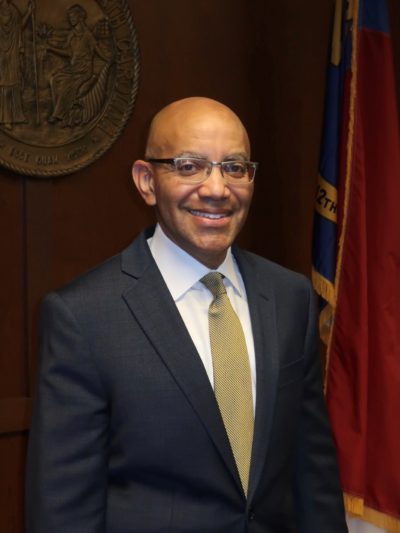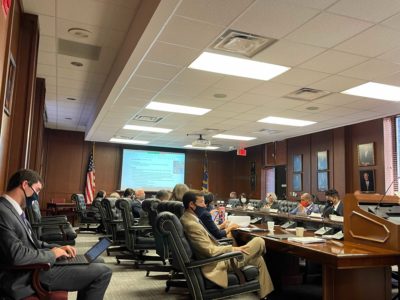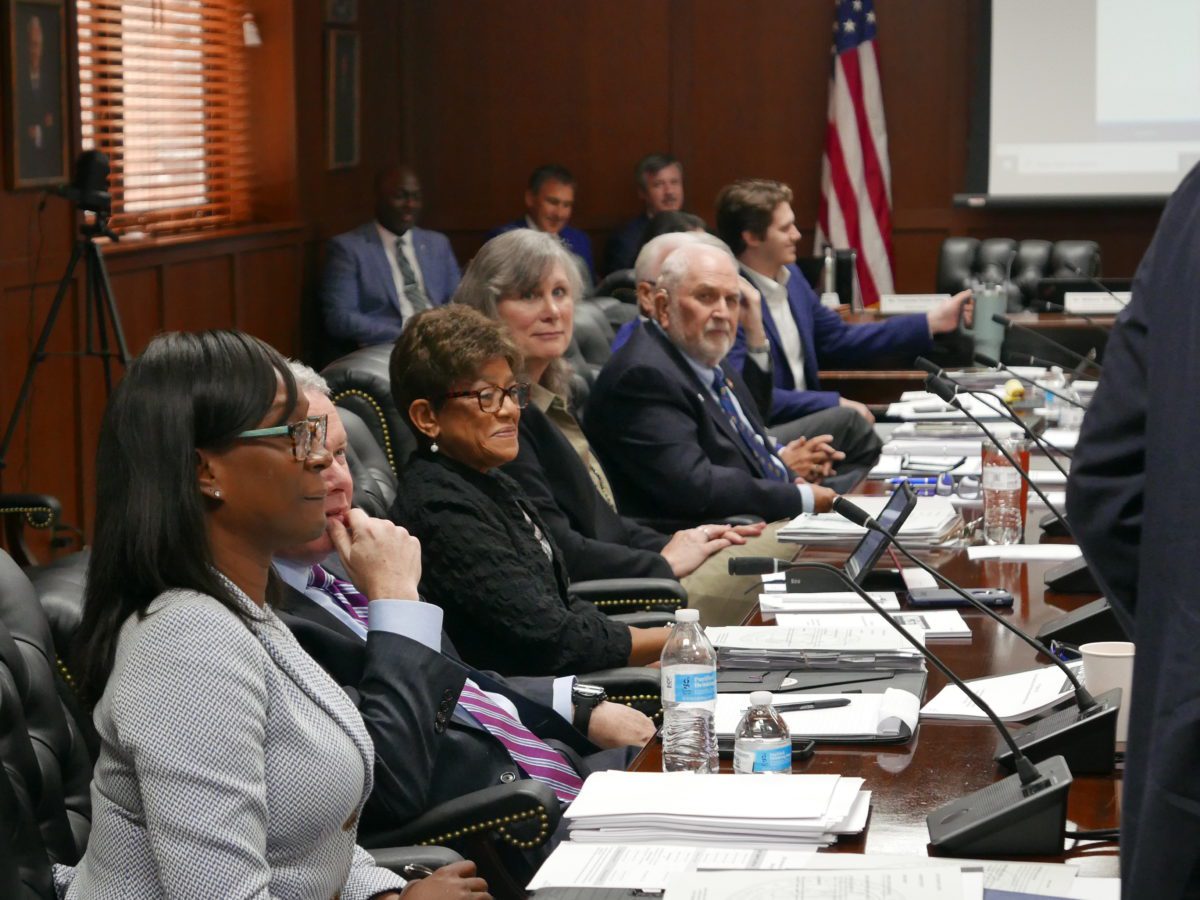

|
|
At the first North Carolina Community College System (NCCCS) State Board meeting since Thomas Stith’s resignation as president, Board members discussed the search for a new system leader.
In a closed-session meeting, the Board appointed a bipartisan presidential search committee consisting of 10 Board members and four other individuals. The Board unanimously voted to hire a firm experienced in higher education leadership searches, the system said in a release.
“The search committee will interview prospective search firms in the coming weeks and will go through the procurement approval process required by the state of North Carolina for such a selection,” the release said. “The search committee will keep the board and the public up to date throughout the process.”
Bill Carver, former president of Nash Community College, was named interim NCCCS president shortly after Stith’s resignation announcement. He served in the interim role previously in 2020.
“I would like to say thank you for welcoming me to this role,” Carver told the Board. “Thank you for your service. Thank you for allowing me this chance to reconnect with my friends and become associated with some of the new talent in the building that I’ve met — it’s only my fourth Friday.”
Board member Ray Russell began Friday’s Board meeting by inviting members to reflect on people, place, and purpose.
“We are going to be taking votes, making motions, discussing policy, but really what we’re here about is providing people, place, and purpose for the employees of this system, for administrators, and ultimately for our students,” Russell said. “For hundreds of thousands, if not millions, of people across the state of North Carolina — that they can have people and place to be safe and a purpose that makes their lives better and makes this great state of North Carolina that we call home a better place to be.”
The meeting focused on streamlining governance structures – a topic the Board will discuss further at its September retreat.
This work is part of the Board’s three-year development and engagement plan. The Board approved recommendations for the plan in April based on the results of its first self-assessment survey. The purpose of the survey was to identify system, Board, and president goals to weave into the four-year strategic plan.
There was also support for a more meaningful partnership with the president and system office, the committee said then in a report of its recommendations. Other recommendations focused on gaining more clarity regarding the vision of the Board. That included the creation of new curriculum for onboarding Board members, evaluating bylaws, and reviewing the “structure, mission, and process” for Board committees.
At last week’s meeting, each Board committee talked about potential updates for their charters. Committees will meet in the next two weeks to discuss changes, the Board said. A governance sub-committee will then work with staff ahead of the retreat to unify charter documents. The Board hopes to approve the updated charters at its October meeting, along with the handbook document for new members.
“This is important work,” member Mark Merritt said. “We really need the best thinking of everybody on the Board with respect to updating our charters. We think this will be a very helpful step in our governance improvement process.”
The Board will defer the creation of new committees until the system’s strategic plan is closer to completion, Merritt said. Previously, some Board members discussed the possibility of adding marketing and communications committees.
The Board expects to review and approve a final version of the 2022-2026 strategic plan at its September meeting.
State performance measures
The Board unanimously approved the 2022 performance measures for student success. Those measures act as an annual accountability report for the system. The seven measures are:
- Basic skills student progress
- Student success rate in college-level English courses
- Student success rate in college-level math courses
- First year progression
- Curriculum student completion
- Licensure and certification passing rate
- College transfer performance
“This is one of the most important things that we do to hold ourselves accountable for the performance of our 58 colleges. It is very important that we measure their performance and we also give the colleges some coaching on ways they can reach proficiency.”
Chair Burr Sullivan
Each measure has a system-wide baseline and excellence level. Baseline levels are set two standard deviations below the system’s average index score. Excellence levels are set one standard deviation above it.
There are five levels of performance: met or exceeded excellence, above average but below excellence, within average, below average but above baseline, and below baseline level.
The report shows increases in student progress in basic skills, curriculum student completion, and college transfer performance.
According to the draft performance summary, there were 13 “Below Baseline Level” delineations across the system. There were 63 “Met or Exceeded Excellence Level” delineations — of which Coastal Carolina Community College was the only one to have four. Four colleges — Brunswick, Catawba Valley, Cleveland, and Western Piedmont — had three, and many had two.
The strategic planning committee discussed the need for interventions before a student fails or drops out at a college.
“This is autopsy data, really” committee member Shirley Carraway said. “We want to pull those students out before that actually happens.”
NCCCS vice president of strategic initiatives Patrick Crane said the system has “a range of robust resources” to help support students. Blue Ridge Community College President Laura Leatherwood said presidents are constantly brainstorming ways to keep students enrolled, using annual performance data to do so.
“Every year when the draft measures come out, we have an opportunity to say, ‘We don’t like that, why is that like that?’” she said. “And of course, we work together. Number one, we’re a little bit competitive, but the other thing is that we want all of us to be better for our students.”
HyFlex defintion
The Board unanimously approved the definition for a new form of curriculum, “Hybrid Flexible (HyFlex),” effective on Sept. 1. Colleges can choose whether or not to offer HyFlex courses.
HyFlex: College curriculum courses in which 100% of the instruction is offered face to face with the instructor in a physical classroom and 100% of the instruction is offered online allowing students an opportunity to choose whether to attend classes during regularly scheduled in-person sessions or participate online synchronously or asynchronously.
North Carolina Community College System agenda documents
In response to pandemic-related challenges, the programs committee first presented the definition to the Board in March. The definition was approved by the Board, which was set to adopt the definition at the April meeting. The HyFlex option joins traditional, online, hybrid, and blended instruction.
Instead, the Board decided in a special vote to extend the public comment period for the definition through July, with plans to adopt a definition at its August meeting.
The decision to delay approval followed feedback from some community college presidents that the proposed definition would create challenges for instructors. Amanda Lee, president of Bladen Community College, spoke on behalf of the North Carolina Association of Community College Presidents (NCACCP) at the April meeting. At that meeting, Lee asked for pause so presidents could understand how to implement the new definition.
Lee spoke in favor of the definition at the special programs committee meeting last Tuesday. Lee said the NCACCP was grateful for the opportunity to respond to the new definition and excited to follow the national trend in offering HyFlex. During the written public comment period, Central Piedmont and Cape Fear community colleges expressed lingering concerns with the definition.
“We still believe this offering of HyFlex and the definition as listed provides the most flexible definition for our students who are at community colleges,” said Levy Brown, NCCCS senior vice president and chief academic officer, at the Tuesday programs committee meeting. “Colleges have the option to utilize the HyFlex model. And again, it’s totally related to changes that were required and needed in response to student learning in the pandemic.”
Apprenticeship report
The programs committee also presented its 2021-22 ApprenticeshipNC Annual Report to the Board. (You can view that report starting at page 101 of this document.) After a record 16,894 apprenticeships in FY 2020-21, ApprenticeshipNC served 13,377 participants last year. Bruce Mack, NCCCS vice president of economic development, said that decrease was partially due to the delayed apprenticeship start of CVS, which he said brings on up to 200 apprentices per month.
“This is an exciting time for apprenticeships,” Mack said. “Since 2017, we’ve actually doubled our numbers across the state in apprenticeships, and that’s partly due to the activities happening across the state. But we also want to give credit to our 58 colleges that are investing in apprenticeships — it shows.”
The NCCCS recently received a $4 million grant from the U.S. Department of Labor to strengthen its ApprenticeshipNC program over the next four years.
Five years ago, the system gained control of the state’s apprenticeship program. The NCCCS turned the program into a national leader in workforce training, doubling apprenticeships in four years. Funding for the $4 million grant started in July and will extend through June 30, 2026. ApprenticeshipNC will use the funds to expand its programs and apprentices in priority industry sectors, the system said. The NCCCS will also aim to diversify the industries that utilize the program.
Historically, apprenticeship programs lack diversity – in part due to apprenticeships existing in predominantly white, male fields. The $4 million grant, NCCCS said, will enable ApprenticeshipNC to create partnerships with communities of color. Last November, the state budget also allocated $12 million to ApprenticeshipNC to fund rural, underserved areas, starting in July 2022.
In North Carolina, 35% of apprentices are minorities, according to the new report, and 25% are female.
The Board also approved 19 new credential-aligned short-term workforce development courses. Fifteen of those support the state’s fast-growing information technology (IT) sector. The courses will help increase high-demand certifications such as Cisco Certified Network Associate (CCNA), Google Data Analytics, Google IT Automation with Python, Google Project Management, and ESRI: GIS Fundamentals.
In fiscal year 2022, Customized Training served 14,104 trainees in 222 projects spending $5.4 million in training costs, according to the annual report for the Economic Development Customized Training section.
The Board also approved the allocation of $3.75 million to support the Finish Line Grant program. The program was initially started in 2018 as a partnership between the Department of Commerce and community colleges. It provides emergency financial aid to community college students. The program will transition to the N.C. Community College System on Oct. 1, 2022.
New college presidents and a surprise state award
Fayetteville Technical Community College President Larry Keen announced his plan to retire from the role last spring, effective Jan. 1, 2023. Keen has served as president since 2008.
Soon after, Fayetteville Tech formed a search committee for a new president.
On Friday, the Board approved two finalists for the position: Pamela Senegal and Mark Sorrells. Senegal, president of Piedmont Community College since 2017, recently completed the Aspen New President’s Leadership Fellowship program for 2020-21. Sorrells is the senior vice president of academic and student services at Fayetteville Tech. He has held the position since January 2019.
The college expects to make a final selection in September, Vice Chair Bill McBrayer said during his personnel report.
The Board also approved a new interim president at Randolph Community College. Longtime Randolph President Bob Shackleford retired at the end of June, and William Aiken briefly served as the interim president. The college named Elbert Lassiter as the new interim president on July 25 but needed formal approval from the Board. Lassiter was the vice president of workforce development and continuing education.
Sondra Jarvis, NCCCS compliance examiner, was also approved by the Board as interim director of State Board relations.
During his legislative committee report, McBrayer said the Board plans to establish quarterly meetings with lawmakers. He encouraged Board members and presidents to stay in touch with their legislative representatives and to invite them on college visits.
“You can pretend that you care, but you can’t pretend to be there,” he said, quoting Golden LEAF Foundation President Scott Hamilton. “When it comes to learning about places and buildings and building relationships, there’s no substitute for going. That’s my challenge to y’all.”
At the start of Friday’s meeting, McBrayer was surprised by the designation of the Order of the Long Leaf Pine, the highest award for state service granted by the governor.
NCCCS staff worked with McBrayer’s wife, Laura, to keep the honor secret ahead of the meeting.
McBrayer was appointed to another six-year team by the General Assembly last year. He has served on the Board since July 2015. He is a founding partner and advisory board member of the Catawba Valley Furniture Academy, which is part of Catawba Valley Community College.
“This is a first — I’m speechless,” McBrayer said. “I don’t know what to say – thank you.”
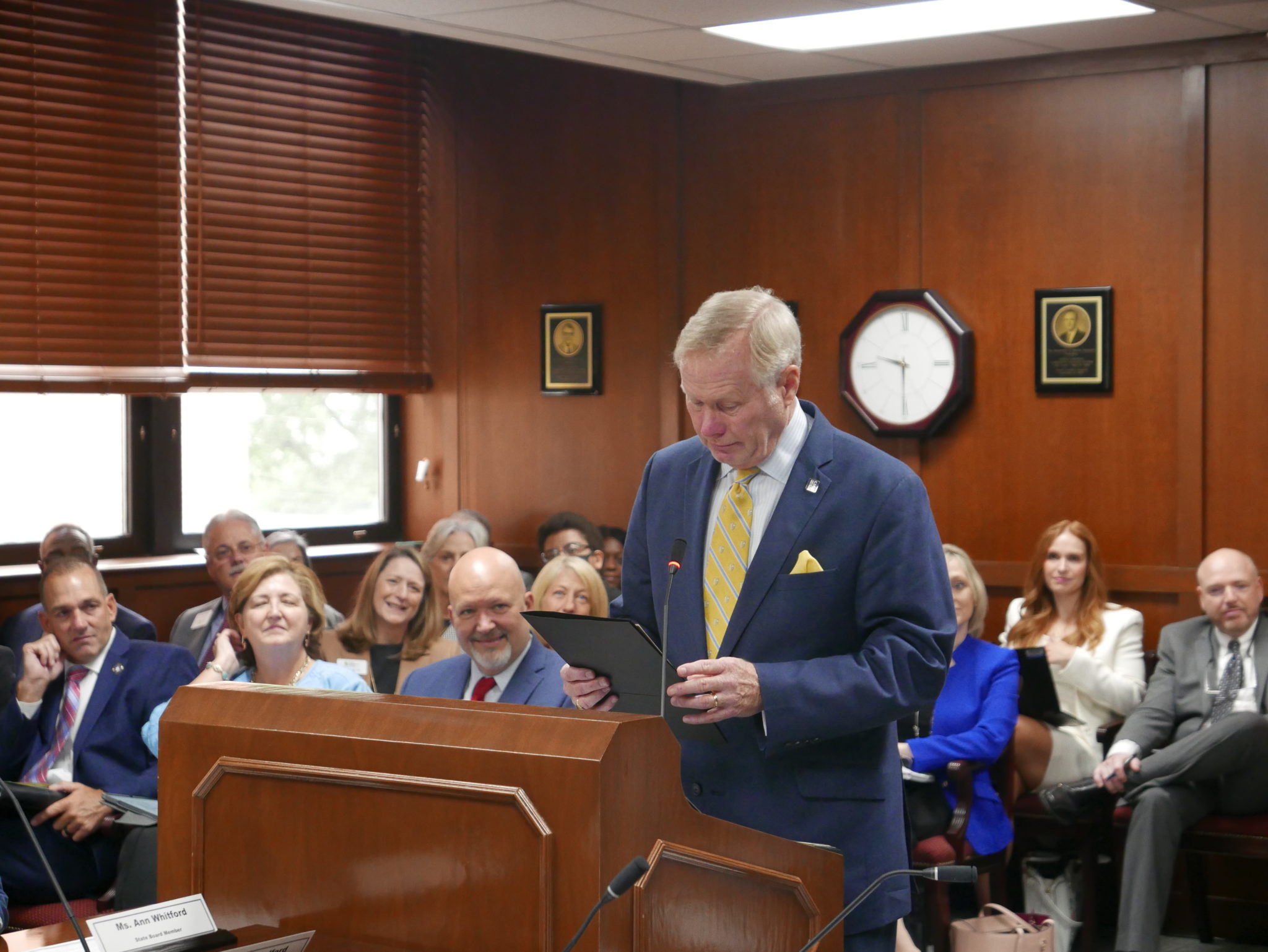

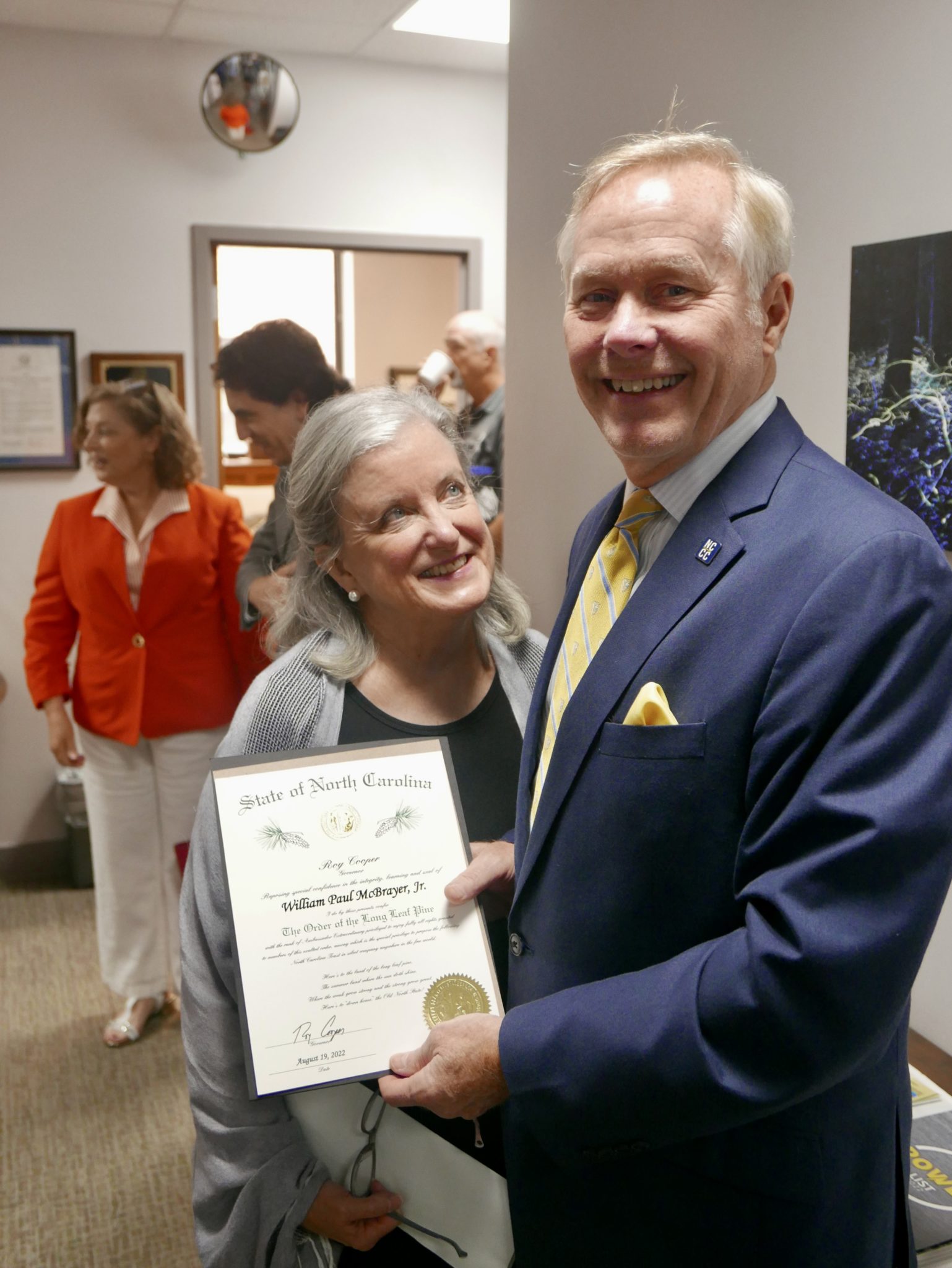

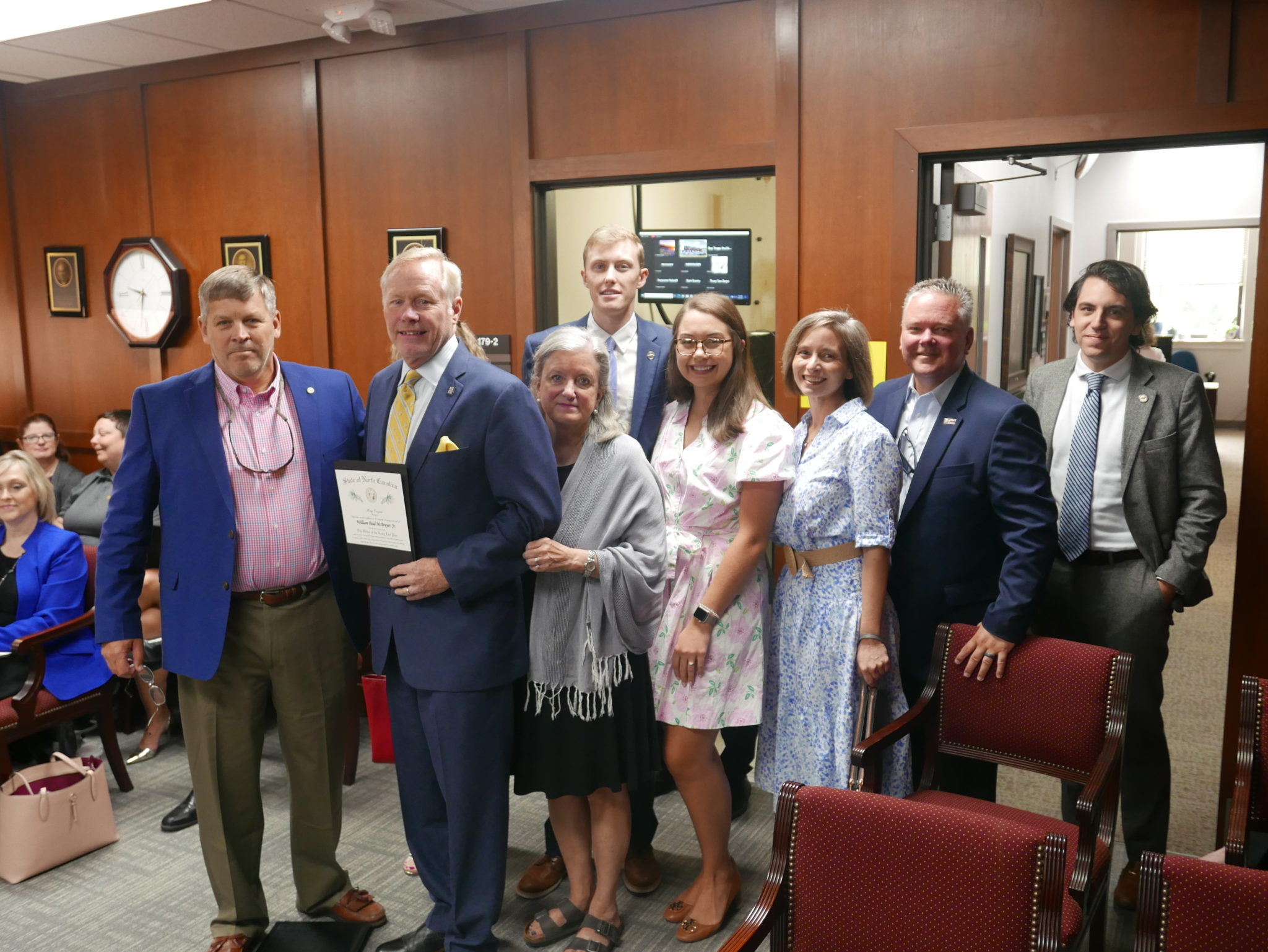

Budget allocations planning
The Board approved its FY 2022-23 State Aid Allocations and Budget Policies, prepared by the system finance team to “allocate funds to the colleges and adopt necessary policies” consistent with the 2022 Appropriations Act that came out of this summer’s short session.
That 90-page document includes guidelines related to state salaries of community college employees, budget allocations, use of state funds and budget flexibility, and information on tuition and fees.
The budget compromise supported additional recurring salary increases for community college employees in FY 2022-23. That total increase is 3.5% across the board. Last year’s budget included a 2.5% pay increase for community college personnel. The short session budget included an extra 1% increase for most employees. (If an employee is paid on an experience-based salary schedule, they get a 2% pay increase.)
“Since these funds are recurring,” the budget document reads, “they have been incorporated into the colleges’ formula and categorical allocations by increasing the base and FTE funding rates.”
Those salary increases were effective July 1, 2022.
No curriculum faculty member can earn less than the minimum amount for his or her education level at the beginning of the contractual period, the state budget said. The system allocations document listed the following minimum faculty salaries by education level.


The budget also decreased funding for community colleges across the state by a little more than $12 million to account for the decrease of 2,009 “full-time equivalent students” at community colleges. Budget FTE is calculated based on the higher of the prior year’s enrollment or the average of the prior two years enrollment.
For FY 2022-23, system-wide budget FTE totals 220,388, the NCCCS allocations document says.
Project Kitty Hawk
The Board’s August issue luncheon focused on Project Kitty Hawk, a nonprofit ed-tech startup with $97 million appropriated from the state to partner with the UNC System to serve adult learners. Project Kitty Hawk Director of Strategy Brian Fleming presented to Board members along with Thomas Walker, senior advisor to the UNC System president for economic development and military affairs.
When Project Kitty Hawk launched last November, many N.C. community college employees worried the startup would detract from the system’s efforts to reach adult learners.
“You know, we have adult learning initiatives as well,” McBrayer said. “So when you touch on job training, things like that, that’s like stepping on the tip of our toes and squeezing. How y’all differentiate between our sandbox and your sandbox I think is the number one question people in this room want to hear.”
North Carolina has an educational attainment goal of 2 million North Carolinians ages 25 to 44 with a high-quality credential or postsecondary degree by 2030. That’s about 67% of adults in that age bracket, according to projections from Carolina Demography.
In North Carolina, there are slightly more than 1 million adults with some college but no degree or credential as of July 2020. Nearly 34% of those adults are younger than 35 and about 54% are ages 35 to 64.
Project Kitty Hawk aims to meet that goal and stabilize enrollment at the UNC System. The organization hopes to roll out operations over the next five years, Fleming said.
So far, no UNC schools have chosen to become the organization’s “clients.” Fleming said he wants to work with the community college system to better understand the “competitive dynamic” Board members discussed.
“I hope this will be the beginning of the conversation,” Sullivan said. “In my view it ought to get much more specific and intentional so that we are not competing with each other for the same student.”
The Board meets next at Cleveland Community College on September 14-16 for its annual planning retreat.



